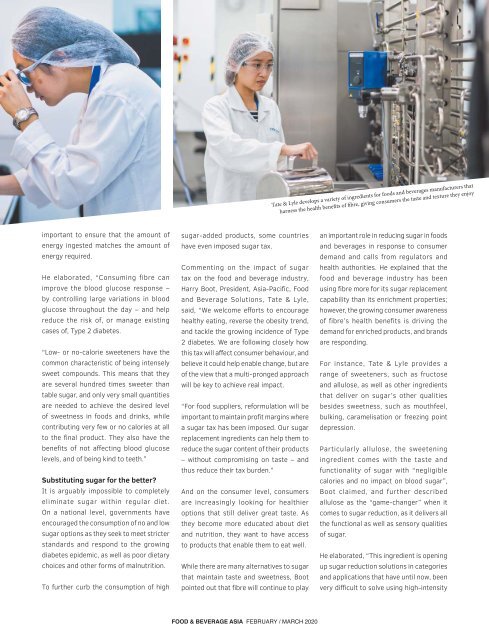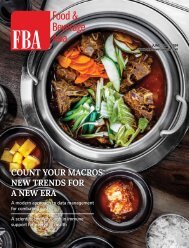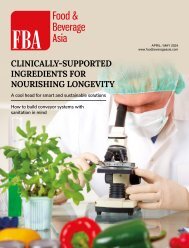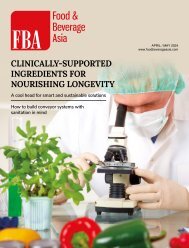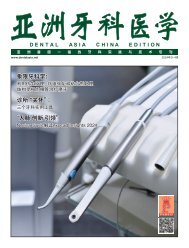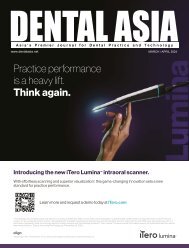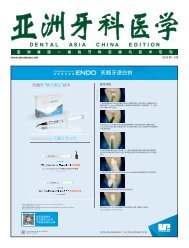Food & Beverage Asia February/March 2020
Food & Beverage Asia (FBA) is the leading source of food and beverage news in Asia since 2002. FBA delivers a comprehensive view of the food and beverage landscape, spanning across the latest health and nutrition trends and industry innovations in ingredients, recipe formulations, food science, sustainability, packaging, and automation, as well as advancements in agri and food-tech.
Food & Beverage Asia (FBA) is the leading source of food and beverage news in Asia since 2002. FBA delivers a comprehensive view of the food and beverage landscape, spanning across the latest health and nutrition trends and industry innovations in ingredients, recipe formulations, food science, sustainability, packaging, and automation, as well as advancements in agri and food-tech.
Create successful ePaper yourself
Turn your PDF publications into a flip-book with our unique Google optimized e-Paper software.
Tate & Lyle develops a variety of ingredients for foods and beverages manufacturers that<br />
harness the health benefits of fibre, giving consumers the taste and texture they enjoy<br />
important to ensure that the amount of<br />
energy ingested matches the amount of<br />
energy required.<br />
He elaborated, “Consuming fibre can<br />
improve the blood glucose response –<br />
by controlling large variations in blood<br />
glucose throughout the day – and help<br />
reduce the risk of, or manage existing<br />
cases of, Type 2 diabetes.<br />
“Low- or no-calorie sweeteners have the<br />
common characteristic of being intensely<br />
sweet compounds. This means that they<br />
are several hundred times sweeter than<br />
table sugar, and only very small quantities<br />
are needed to achieve the desired level<br />
of sweetness in foods and drinks, while<br />
contributing very few or no calories at all<br />
to the final product. They also have the<br />
benefits of not affecting blood glucose<br />
levels, and of being kind to teeth.”<br />
Substituting sugar for the better?<br />
It is arguably impossible to completely<br />
eliminate sugar within regular diet.<br />
On a national level, governments have<br />
encouraged the consumption of no and low<br />
sugar options as they seek to meet stricter<br />
standards and respond to the growing<br />
diabetes epidemic, as well as poor dietary<br />
choices and other forms of malnutrition.<br />
To further curb the consumption of high<br />
sugar-added products, some countries<br />
have even imposed sugar tax.<br />
Commenting on the impact of sugar<br />
tax on the food and beverage industry,<br />
Harry Boot, President, <strong>Asia</strong>-Pacific, <strong>Food</strong><br />
and <strong>Beverage</strong> Solutions, Tate & Lyle,<br />
said, “We welcome efforts to encourage<br />
healthy eating, reverse the obesity trend,<br />
and tackle the growing incidence of Type<br />
2 diabetes. We are following closely how<br />
this tax will affect consumer behaviour, and<br />
believe it could help enable change, but are<br />
of the view that a multi-pronged approach<br />
will be key to achieve real impact.<br />
“For food suppliers, reformulation will be<br />
important to maintain profit margins where<br />
a sugar tax has been imposed. Our sugar<br />
replacement ingredients can help them to<br />
reduce the sugar content of their products<br />
– without compromising on taste – and<br />
thus reduce their tax burden.”<br />
And on the consumer level, consumers<br />
are increasingly looking for healthier<br />
options that still deliver great taste. As<br />
they become more educated about diet<br />
and nutrition, they want to have access<br />
to products that enable them to eat well.<br />
While there are many alternatives to sugar<br />
that maintain taste and sweetness, Boot<br />
pointed out that fibre will continue to play<br />
an important role in reducing sugar in foods<br />
and beverages in response to consumer<br />
demand and calls from regulators and<br />
health authorities. He explained that the<br />
food and beverage industry has been<br />
using fibre more for its sugar replacement<br />
capability than its enrichment properties;<br />
however, the growing consumer awareness<br />
of fibre’s health benefits is driving the<br />
demand for enriched products, and brands<br />
are responding.<br />
For instance, Tate & Lyle provides a<br />
range of sweeteners, such as fructose<br />
and allulose, as well as other ingredients<br />
that deliver on sugar’s other qualities<br />
besides sweetness, such as mouthfeel,<br />
bulking, caramelisation or freezing point<br />
depression.<br />
Particularly allulose, the sweetening<br />
ingredient comes with the taste and<br />
functionality of sugar with “negligible<br />
calories and no impact on blood sugar”,<br />
Boot claimed, and further described<br />
allulose as the “game-changer” when it<br />
comes to sugar reduction, as it delivers all<br />
the functional as well as sensory qualities<br />
of sugar.<br />
He elaborated, “This ingredient is opening<br />
up sugar reduction solutions in categories<br />
and applications that have until now, been<br />
very difficult to solve using high-intensity<br />
FOOD & BEVERAGE ASIA FEBRUARY / MARCH <strong>2020</strong>


